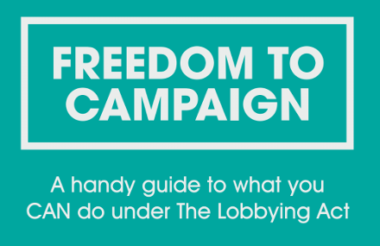A free guide to campaigning within the Lobbying Act to help charities understand what is within the law has been published by Campaign Collective today.
Campaign Collective, a social enterprise which helps campaigners with communications support, said it had produced the guide - Freedom to Campaign - because fewer charities have been campaigning since the legislation was introduced. It said research suggests that charities are confused by the Act.
Nancy Platts, member of Campaign Collective and co-author of the guide, said: “As a former parliamentary candidate at two general elections, I saw a marked decrease in the number of small charities and campaigners approach me after the 2010 General Election and once the Lobbying Act was introduced.
“The Freedom to Campaign Guide is designed to be a simple, plain English interpretation of more than 104 pages of official guidance which small charities and campaigners could not be expected to wade through.”
Five quick tips
The 12-page guide explains what charities can and can’t do under
It includes five quick tips, which are:
1. Stay focused: If you have a campaign underway, it is unlikely to be covered by the Act
2. Stay neutral: Don’t be party political, and don’t publicly shame politicians who don’t support you.
3. Stay within the law: check out the public and purpose tests
4. Stay clever: There are plenty of campaign tactics not covered by the Act
5. Stay on top of time: Keep records of time and expenses spent on regulator
‘Campaigning under threat’
Earlier this week the Sheila McKechnie Foundation warned of a “crisis” for charity campaigning and revealed the results of a poll which found that nearly half of respondents thought things had got worse in the last year.
Just over 150 charity professionals were surveyed by the foundation, which champions campaigning, and 90 per cent said that they think charity campaigning is under threat.
Some 87 per cent said government measures were threatening the legitimacy of campaigning and 63 per cent said senior leaders and trustees were more cautious.
Sue Tibballs, chief executive, said: “The evidence suggests that unclear lobbying legislation and unhelpful rhetoric have knocked charities’ confidence to speak out. Sadly, it’s all too easy to confuse party political activity – which everyone understands is illegal – with proper participation in political debate.
“The government has a duty to clarify that it recognises charities’ legitimate role in our political process. Government, charities and the media all want to improve public trust, and none of us will do so if we dismiss the value of the others.”
Charities have repeatedly asked the government to reform the Lobbying Act, but the government has said this is unlikely to happen during the current legislative session.
Related articles












